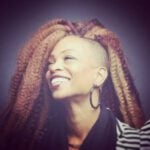“They be our national treasure / they be / our priceless charge” (A Dark and Splendid Mass 47-48) are the lingering words of Mari Evans when speaking of “The Elders.” In literally doing so, I recall seeing my grandmother read on the side of her bed in the still of the night when the house was hushed and the worlds leapt off the page and into hallways of 3506. I can remember my grandmother, Ruth Jackson, who birthed 13 children and, between children, proceeded to night classes at Arlington High School because reading, learning, and education were key to her continual growth. All of her children are/were readers. I learned of Amy Tan through my Aunt Bettie and James Baldwin by my Uncle Kenny. My parents introduced me to Mari Evans, literally. Going with my family or meeting friends at the library was a whole activity. It was/is in the pages of books I learned how to articulate my being. Like Baldwin reminds me, “You think your pain and your heartbreak are unprecedented in the history of the world, but then you read.” Still, I get lost in books, and the thought of someone else telling me what I cannot read is unfathomable when I think about the indomitable will of my ancestors.
There is a book war. Books and libraries (public school and public) are under attack. Two years ago, in Ilano County, Texas, Seventeen titles that primarily dealt with race and identity themes, including Isabel Wilkerson’s “Caste: The Origins of Our Discontents” and a teen title that called the Ku Klux Klan, a terrorist group, were removed from the shelves and digital access was suspended. When the Library Board did not agree with the book bans, the board was replaced with community members who agreed (usurping the board process), and the ban proceeded. Seven community members filed a lawsuit stating “the coordinated censorship campaign violates the First Amendment and 14th Amendment,” a federal judge agreed, ordering the books back into circulation and prohibiting the county judge and commissioners from removing any more books off shelves. The county then proposed to close all the libraries in the county, and that is a different, more nefarious alarm being rung. We know that sound; Clinton High School was bombed and burned after Brown v. Board of Education.
We cannot relegate these issues or concerns to Texas, Tennessee, or Vermont. Here, in Indiana, Fishers (Hamilton East Public Library) titles are being censored; juvenile and teen books are being shuttled out of their respective collections to adult collections. Public library board member Stephen Lane says, “The library should reflect the community it serves, “ and type of censoring can have an adverse effect (as expressed in this week’s podcast).
More on book bans
Along with Texas, Florida, Utah, and Missouri, Indiana has welcomed some of the same educational laws restricting parents and allowing others to determine what is best for their children. Specifically, House Bill 1447 (HB1447) allows the public to request that certain books found in school libraries be removed. (The public must live in the challenged school district and
have a child in the school). “HB1447 requires school libraries to publicly post a list of books they offer and provide a complaints process for community members. Schools and librarians can no longer argue, as a legal defense, that the texts in their libraries have “educational” value. The law still allows them to argue the text has literary, artistic, political or scientific value.”
The bill presumes there was no challenge process before it, which is not true. It also allows persons outside of the parent to determine what is and is not acceptable for the child. In a state that wants less government, the act seems contrary. Nobel Prize winner Toni Morrison said, “[book bans] struck me as a purist yet elementary kind of censorship designed to appease adults rather than educate children. Amputate the problem, band-aid the solution.”
“[Book bans] closes the doors to new experiences, diverse and rich worldviews, and the ability to discover and challenge ideas,” NYPL President Anthony W. Marx said in a statement. These censoring/banning ideals close the doors to exploration, imagination, curiosity, and discovery, and who are we to take that from the children?
Tasha Jones is an author, poet, educator, researcher, and Ph.D.(c). She is the Reginald L. Jones Fellow and is currently completing a manuscript entitled PYRAMIDS. PLANTATIONS. PROJECTS. PENITENTIARIES. All social media @iamtashajones.
For more news on book bans coverage courtesy of the Indianapolis Recorder, click here.
Tasha Jones is a poet, writer, researcher, and educator whose work explores language as a tool for liberation and resistance. She hosts In the Beginning: The Spoken Word Podcast, the #1 spoken word podcast on Apple and Spotify. Tasha is also the Poems & Parables Literary Journal editor and is currently writing Pyramids. Plantations. Projects. Penitentiaries. You can follow her on social media: @iamtashajones, @itbspokenwordpod, and @poemsandparables.








